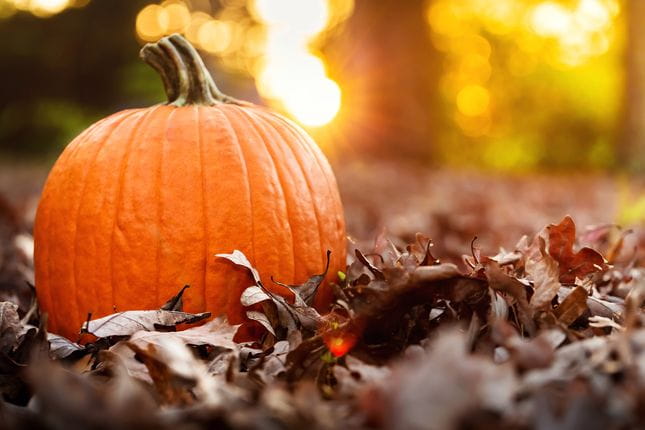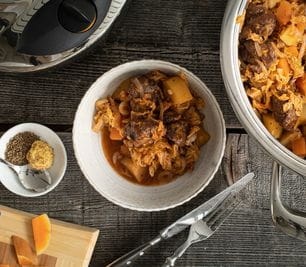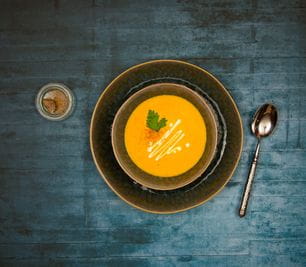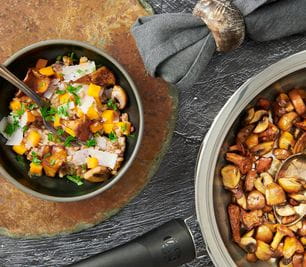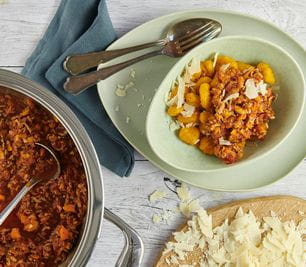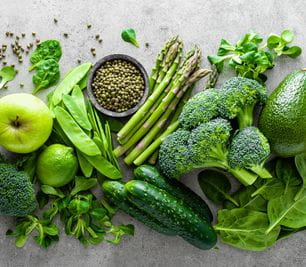Did you know that there are about 800 different types of pumpkin and that it’s not really a vegetable? More exciting pumpkin facts, plus tips and tricks for using it in the kitchen, can all be found in this blog entry.
Pumpkin facts you should know
- An astonishing variety: When most people think about pumpkins, they picture a vivid orange color. But did you know that pumpkins also come in other colors such as white, green, yellow and even several shades of gray? And it’s not just the color but also the structure that is diverse: the surface of the skin can be smooth, cork-like or with ridges.
- The huge pumpkin family: It’s an incredible number, but it’s true: there are about 800 different types of pumpkin. Not all of them are good for eating, however. As a rule, ornamental pumpkins are smaller, bitter to taste and in fact are inedible owing to their cucurbitacin (bitter substance) content. With their unusual shapes and colors, they are best suited to use as attractive fall decorations. About 200 pumpkin types are edible and can be used in cooking.
- A very special berry: Pumpkin is related to zucchini and is a member of the cucurbit family. In botanical terms, pumpkin is not really a vegetable but rather a berry. In the fall, its delicious pulp is used in cooking while the seeds are processed into high-quality oil. Fun fact: the heaviest pumpkin so far recorded weighed an incredible 782 kilograms![1]
- The origin of the pumpkin: The first pumpkins in Europe were brought by the Spaniards from Latin America in the 16th Century. In Central and South America, pumpkins have been used by the indigenous peoples as staple foodstuffs for thousands of years.
- A wondrous source of vitamins: Not only are pumpkins super delicious, they’re also super-healthy. With up to 90% water content, pumpkin is very low in calories.They do however contain important vitamins and nutrients such as beta-carotene, iron, potassium, and phosphorus. The silicic acid contained in the flesh is good for the connective tissues, the nails, and the skin.
[1] Industrieverband Agrar: Farben, Formen, Muster und Grössen – der Kürbis beeindruckt durch seine Vielfalt, URL: Farben, Formen, Muster und Größen - der Kürbis beeindruckt durch seine Vielfalt | Industrieverband Agrar (iva.de) (26.09.2022)
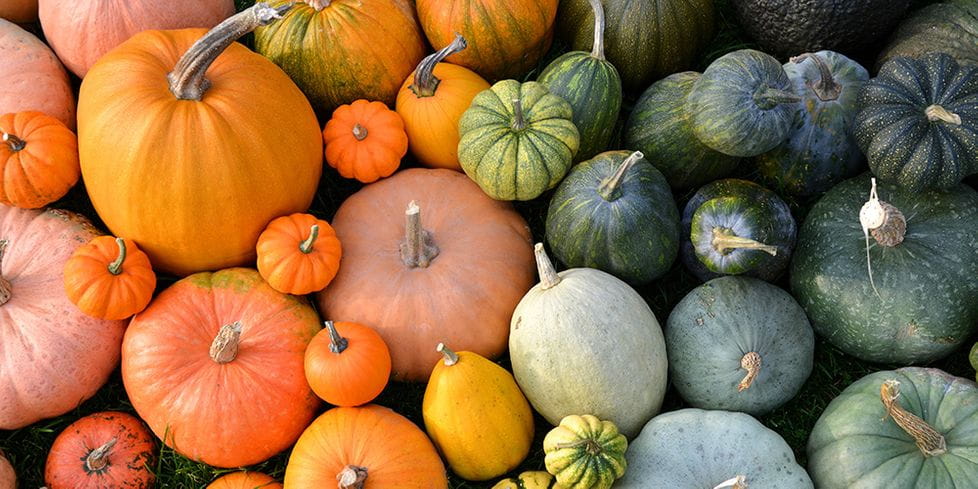
Autumnal, tasty, and decorative: the diverse uses of pumpkin
Whether for cooking or for decoration during the fall season, pumpkins are used for a wide range of purposes. The days are shortening, the weather is getting colder, but the many types of pumpkin bring color to the fall season. With their variety of colors and shapes, ornamental pumpkins offer many different decorative options for both indoors and outdoors. Which types of pumpkin are used in cooking? You’ll find out below.
But the pumpkin still has more to offer. It has particular importance around Halloween, and is a fixture of the decorations for this spookiest of annual celebrations. The tradition of the Halloween pumpkin comes from Ireland. In the manner of jack-o’-lanterns, pumpkins are carved out and given scary decorations.

The pumpkin and its culinary importance
It’s hard to imagine cooking without pumpkin today, particularly in the fall, and they bring some variety to your plate. Highly versatile, they can be used in soup, pasta dishes, as a side, in lasagne, in pies, in compote and in risottos. They can even be used in a goulash. Depending on the pumpkin type and recipe, Muscat pumpkin or red kuri squash, for example, can be cooked particularly quickly and energy-efficiently using the Secuquick, the quick cooking lid from AMC, in the soft program. You can find the relevant pumpkin recipe right at the bottom.
Even in sweet recipes, the pumpkin tastes great in cakes or in jam. The scent of the flesh makes it highly versatile in the kitchen. Furthermore, you can also use the pumpkin seeds, which make a perfect, healthy snack. Pumpkin seed oil lends a particular note to dishes such as soups and risottos.
Good accompaniment for pumpkin recipes are exotic spices and flavors such as ginger, curry powder, or coconut milk. Pepper, paprika, chili, nutmeg, and garlic also add a note of piquancy to pumpkin recipes.
Which types of pumpkin are best suited to which recipes – find out in the next section!
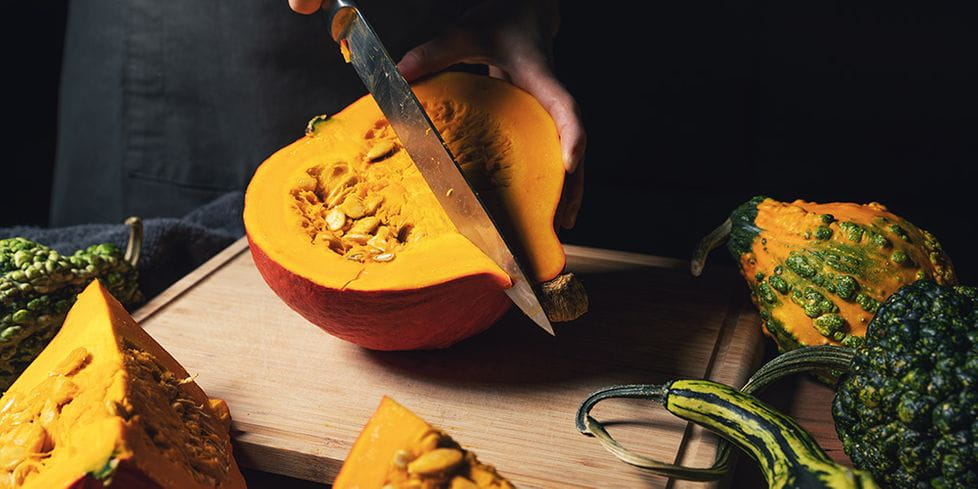
Which type of pumpkin is best for which recipe?
As we have already seen, there are many different types of pumpkin. Some of them have individual flavors that make them particularly suitable for particular recipes.
- One of the most popular edible pumpkins is the orange-colored Hokkaido or kuri squash. Its nutty taste makes this type particularly good for soups, stews, and even raw in a salad.
- The spicy, nutty-tasting butternut squash is also one of the most commonly used edible pumpkins. Its name is not without good reason, as the flesh of this orange-colored pumpkin has a slightly buttery taste. For pumpkin recipes such as gnocchi, spaetzle au gratin, and soups, or even for making jam, butternut squash is ideal.
- With its slightly fruity taste, the yellow spaghetti squash is perfect for gratins, or can be used in a low-carb recipe as a replacement for spaghetti for a delicious Bolognese.
- Muscat pumpkin has a sharp fruity taste and a hint of nutmeg. With its intense flavor, this type of pumpkin can be used in many ways: in soups, desserts, and cakes or for pesto, chutney, or gratin.
- And in yellow, white, or black and green is the Pattisson (pattypan) pumpkin. Braised, steamed, roasted or pickled – this spicy squash will find one way or another to become a delicacy in the kitchen.
Has this awakened an appetite for a good pumpkin recipe? Discover our tasty pumpkin recipes and start cooking your favorites straight away!






































